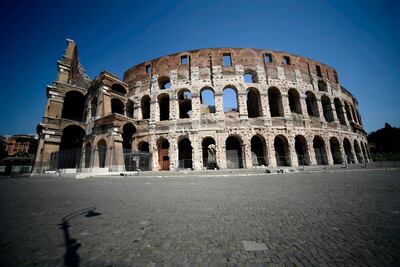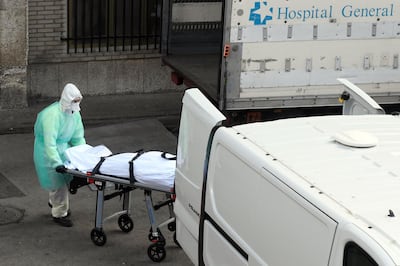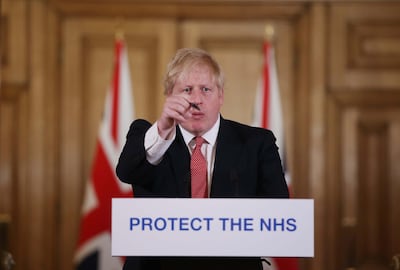Governments around the globe continue to grapple with how to stop the spread of the coronavirus known as Covid-19.
The effects have battered economies, and across Europe, home to more than 746 million people, countries have closed borders and schools, imposed travel restrictions and told non-essential employees to work from home.
Since Covid-19 was detected in the Chinese province of Hubei in December, it has spread to more than 100 countries. By the end of April, there were 3.1 million cases, with about 220,000 deaths.
Some of the worst-hit countries in Europe, including France, where the football season is over, Italy, where politicians protested against the lockdown, and Spain, are beginning to ease lockdown measures.
Germany, which saw fewer deaths, is also slowly opening up while British Prime Minister Boris Johnson said the UK was past its peak.
German Chancellor Angela Merkel called the pandemic a historic test for the EU.
EU finance ministers agreed on €500 billion worth of support for their coronavirus-battered economies
How many cases are in Europe and the UK?
How is each country managing the crisis?
Italy
Infected: 210,717
Deaths: 28,884
- Italy has the third-most cases in the world behind only Spain and the US.
- About 4 million construction and factory workers returned to work on May 4.
- Some businesses were allowed to open earlier.
- Right-wing politician Matteo Salvini staged a two-day occupation of the country's parliament.
- In northern Italy, in the heart of the country's outbreak, a witness told The National: "It's so unbelievably quiet."
- Italy managed to cut the rate of infection to 1 per cent.
The death toll of 969 on March 27 was the largest number in a single day.
The military was called in to the city of Bergamo, north-east of Milan, to move corpses to neighbouring provinces when mortuaries and crematoriums were overwhelmed.
- Student doctors' final exams were scrapped so that 10,000 of them can join the national health system, which has been buckling under the vast number of cases and further hampered by figures revealing that thousands of medical workers have been infected.
- The Vatican conducted tests for coronavirus on the dozens of priests who live in the same residence as Pope Francis, and making contingency plans to move those who have the disease diagnosed elsewhere, a source said on March 26.
Prime Minister Giuseppe Conte announced on March 16 that quarantine measures "must be extended" beyond their original deadlines.
- The lockdown was imposed on March 8 in the red zones of the northern region, considered the centre of the crisis, which has reported two thirds of all deaths. It was extended nationally on March 12 when the whole country was declared a Covid-19 orange zone.
- There were heavy restrictions on travel. People must remain housebound unless they have a valid reason to leave home.
- Schools and universities, gyms, museums and cultural venues, nightclubs, cinemas, theatres, casinos and most other venues across the country were closed.
- People may visit religious institutions but must stay a metre away from each other. Marriages, baptisms and funerals have been cancelled.
France
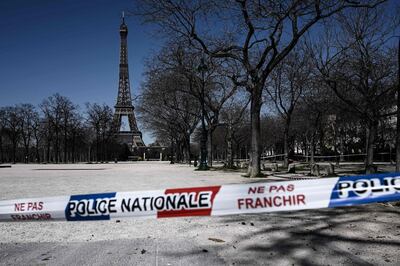
Infected: 168,925
Deaths: 24,864
- France has reported a highest one-day death toll of 833 people on April 6.
During the lockdown, the French economy shrank 5.8 per cent, the most since 1949.
- On March 16, French President Emmanuel Macron declared that "we are at war against an invisible and elusive enemy".
France is due to start lifting some confinement measures from May 11.
- The country turned high-speed trains into hospitals on wheels.
- As the death count raced past 8,000, almost 7,000 more patients were in intensive care
- A strict 15-day lockdown began on March 17 and was enforced by tens of thousands of police patrolling the streets.
- Any proscribed journeys – those not for vital work, family reasons or medical appointments, to buy food and necessary groceries or, in some cases, to exercise – would be punishable with a warning, a fine or even immediate arrest.
- Authorities on the French Riviera began using a drone fitted with a loudspeaker to tell people to stay home.
- Food shops, chemists, banks, tobacconists and petrol stations are open. Religious buildings also remain open, although ceremonies should be postponed.
- Sporting and cultural activities are prohibited, and public transport limited.
- French voters had to decide whether to brave the outbreak to head to polling stations for the first round of local mayoral elections on March 15, but the second round was later postponed until June 21.
- When people are not in their homes, they must comply with social distancing rules by keeping at least 1 metre apart, even when queuing.
Spain
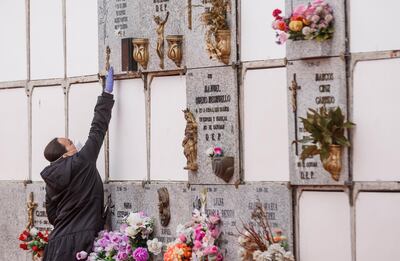
Infected: 217,466
Deaths: 25,264
- The epidemic in Spain has become the worst in Europe, and the second-worst in the world, behind the US. It has more cases than China.
- On May 1, a temporary hospital built to deal with patients was closed, a symbolic victory.
- The lockdown was extended to May 31 but some factory and construction workers returned to work earlier.
- On March 14, Prime Minister Pedro Sanchez announced a state of emergency, introducing significant restrictions on movement through the country. Only trips to buy food, medicine or essential products, or those deemed to be justified, were initiaklly allowed.
- More than a third of reported cases are in Madrid, with one news site reporting on March 16 that one person died from coronavirus every 16 minutes.
All hotels and other tourist accommodation were ordered to close by March 24 to "guarantee the containment of the pandemic", and to limit the effect on medical centres. One hotel in Madrid was converted to treat those with mild cases.
Crematorium services are running 24 hours a day and an ice rink is being turned into a morgue.
Spanish soldiers have found elderly patients abandoned and dead in retirement homes.
In a radio statement, the president of the region of Madrid, Isabel Diaz Ayuso, warned that eight in 10 people in the capital would be infected.
Other hotspots include Vitoria and Labastida in the Basque country, Catalonia and the Rioja region. One area in Castile and Leon is regarded as a high-transmission area.
Health Minister Salvador Illa announced on March 19 that the government would add 30,000 reinforcements to the medical system, which was later raised to 50,000, including recently retired physicians and trainee doctors.
Those who breach the lockdown face fines from €100 to €600,000, and a prison sentence. Police say that 49 people have been arrested.
Schools and all venues that carry out "public-facing" activities and services, except those that sell food or essential items, are closed. Restaurants may deliver meals to people's homes.
Civil and religious ceremonies, and services in places of worship including funerals, can go ahead but with no large crowds and those attending must stay 1 metre from each other.
Britain
Infected: 187,842
Deaths: 28,520
The UK has announced its second three week lockdown.
Prime Minister Boris Johnson has said the outbreak has reached its peak.
Mr Johnson was admitted to an intensive care unit after failing to shake off coronavirus symptoms. He has since left hospital to recover at his official country home Chequers.
Health Secretary Matt Hancock also tested positive for the virus and and chief medical officer Chris Whitty went into self-quarantine for seven days after exhibiting mild symptoms.
Britain has been placed on lockdown, with harsh new restrictions on daily life imposed by the government following similar measures in neighbouring countries.
Public gatherings of more than two people have been banned. British police have been using drones and roadblocks to enforce the social isolation rules.
Shops that do not sell groceries or essential health items have been ordered to close by Mr Johnson. Other areas including libraries, playgrounds and outdoor gyms, and places of worship, must close immediately.
The government has also stopped all social events including weddings, baptisms and other ceremonies, but funerals will be allowed. Parks will remain open for now so people can exercise once a day. Mr Johnson said the rules would be reviewed in April, with the aim of relaxing them if possible.
- Mr Johnson insisted that the UK could "turn the tide" against the coronavirus by June if it abided by social isolation measures.
- He has come under fire for declining to take part in an EU scheme to source critical ventilators to treat Covid-19 because the UK is "no longer a member" and is "making its own efforts".
- UK Chancellor Rishi Sunak has pledged £350 billion (US$434.14bn/Dh1.59 trillion) to protect the economy and the Bank of England has lowered interest rates to a record low of 0.1 per cent.
- London has been the UK city worst hit by the outbreak so far.
- Prince Charles, heir to the British throne, has tested positive for the virus and is self-isolating with his wife, Camilla.
- More than 170,000 people volunteered to help the country's health service in a single night.
- Schools and universities closed with effect from March 20.
- More vulnerable groups in Britain, such as people over the age of 70 or those with underlying chronic health conditions, have been told to avoid social contact for 12 weeks.
- The government says it is now in the phase to delay the disease, as well as trying to contain it.
Households where an occupant has symptoms of Covid-19 have been advised to isolate themselves for 14 days.
- Internationally, the UK has pledged £91 million to the global response tackling Covid-19 and has committed up to £150m to the International Monetary Fund's Catastrophe Containment and Relief Trust.
- The UK's Interior Ministry faces a legal challenge over suspected outbreaks of the virus in its migrant detention centres.
Germany
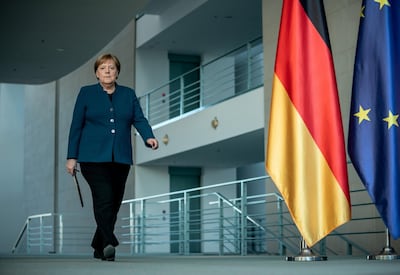
Infected: 165,664
Deaths: 6,866
- The German government was among the first in Europe to start easing its restrictions.
- In the first steps, small shops were allowed, larger shops followed later and people must wear masks when they leave home.
- Schools msueums and houses of worship reopened on May 4.
Germany launched Europe's first antibody testing programme to try to determine how many people were immune to Covid-19 and how many were infected without knowing it.
- On March 22, in a televised address, Mrs Merkel expanded curbs on social interaction, banning groups of more than two people from gathering, except for families. Soon after that, her office announced the Chancellor would be self-isolating because a doctor who had treated her a few days earlier had tested positive for Covid-19.
- On March 18, in her first televised address to the nation in more than 14 years in power, Mrs Merkel said the country was facing its greatest challenge since the Second World War.
- Scientists around the world are at a loss to understand why the death rate is significantly lower in Germany than other countries, despite the high number of confirmed cases. Its fatality rate is 0.3 per cent compared to about 8 per cent in Italy.
- Germany has had a low death rate compared to many others.
- he Robert Koch Institute for public health said that up to 10 million Germans could contract coronavirus in the coming months if social contact was not reduced.
- The small Bavarian town of Mitterteich became the first to go into complete lockdown on March 19.
The federal government on March 16 agreed on a widespread set of measures with 16 states, advising residents to work from home where possible, banning large events and religious services, and closing schools, daycare centres, recreational facilities and many shops.
- Essential shops, such as grocery stores, banks, pharmacies and petrol stations remained open, and restaurants can serve customers inside during particular hours, with restrictions on distancing and numbers, and sell takeaway meals from 3pm.
How is this affecting travel?
No easy question to answer. A mind boggling array of travel restrictions has been implemented in recent days and weeks by countries around the globe in an attempt to curb the spread of Covid-19.
The measures are constantly changing and any nation may further limit travel without notice.
The EU suspended all non-essential travel to the bloc for non-EU citizens for 30 days from March 17. Citizens of EU countries are allowed to return home, but some jurisdictions require them to self-isolate for 14 days.
The UK was initially warning against all non-essential travel but as of March 23 advised all Britons abroad who are usually based in the UK to return home immediately, and, for the moment, is exempt from the ban. Brussels has told individual nations to enforce the closures or adjust movement rules to suit themselves.
Across the region, train, cross-border bus and ferry companies are running on a reduced service; while some ports are open, passengers are generally not allowed to disembark for travel or tourism reasons.
Within the bloc, some countries have introduced even tighter measures. Austria, for example, has banned all travellers, irrespective of citizenship, from Italy, Switzerland and Liechtenstein. Croatia says that anyone coming in from Italy must go into a government quarantine facility at their own expense for 14 days, while travellers from certain other countries, including Spain, must self-isolate.
International transport links from France are increasingly restricted and border checks are being enforced with Italy, Spain and Germany.
Germany has also introduced border controls with Austria, Denmark, France, Luxembourg and Switzerland, and expanded air restrictions to flights from those countries as well as Italy and Spain.
There are strict travel restrictions on flights to and from Italy, with only one airport in each region open and temperature checks for those arriving.
Alitalia passengers are required to wear their own face masks when the 1-metre rule cannot be applied.
The US is refusing entry to non-citizens from all European countries, including the UK and Ireland.
In Bolivia, all flights to and from Europe have ceased, while Morocco has suspended flights from Italy, Germany, France and Spain.
Travellers to Japan from the 26 members of the Schengen zone, Britain and Ireland, must go into self-quarantine in facilities approved by the authorities there.
Any foreign traveller who has been in France, Germany, Italy or Spain within 14 days may not enter Singapore, although the country’s residents and passport holders may do so as long as they quarantine at home for two weeks.
The Thai authorities are insisting that anyone flying in from a list of countries, including Italy and Iran, has proof of travel insurance, with at least $100,000 in coverage, and must produce a health certificate confirming a negative test result for Covid-19.
How is this affecting the region?
Russia's Putin suspends vote on constitution change allowing him to stay in power
Europe's farmers face rotting crop crisis as seasonal workforce stays at home during lockdown
Grand hotels are converted to hospitals in Spain as Prime Minister Pedro Sanchez calls for EU aid
Greta Thunberg self-isolating with coronavirus symptoms
Boris Johnson’s office denies aide wanted to ‘let pensioners die’
Germany's Angela Merkel in quarantine after her doctor tests positive for virus
What is the coronavirus and how is it spread?
Coronaviruses are a large family of viruses which may cause illness in animals or humans. Covid-19 is only the most recently discovered strain.
In humans, seven coronaviruses are known to cause respiratory infections, including the common cold and more severe diseases such as Middle East respiratory syndrome (Mers) – first recorded in Saudi Arabia in 2012 – and severe acute respiratory syndrome (Sars) which swept through southern China and Hong Kong in 2002 and 2003.
Covid-19 has affected far more people.
But it is far less deadly, with a mortality rate which is believed to be around 3.5 per cent, according to an estimate by the World Health Organisation, compared with about 10 per cent in Sars and 34 per cent in Mers.
The most common symptoms of Covid-19 are fever, tiredness and a dry cough. Some patients may have aches and pains, nasal congestion, sore throat or diarrhoea and, rarely, a runny nose.
Read more: What to do if you think you have coronavirus?
The elderly, and those with underlying medical problems such as high blood pressure, heart problems or diabetes, are more likely to develop serious illness.
According to a doctor who fought the outbreak in Wuhan, high blood pressure is a major risk factor. Out of a group of 170 patients who died in January in Wuhan – in the first wave of casualties caused by the pathogen – about half had hypertension.
A study of 44,000 patients by the Chinese Centres of Disease Control found only 0.2 per cent of children and teenagers died, compared with almost 15 per cent of people above the age of 80.
How does this compare to the global picture?
The highest death toll outside of Europe is in the US, where there has been more than 25,000 deaths.
China has recorded more than 3,300 deaths, followed by and Iran, where about 4,600 have succumbed to the virus.
The outlook in the Gulf in terms of suffering caused by the virus is much lower than that witnessed elsewhere in the world.
Experts have put that down to countermeasures taken early on in the crisis, unlike a country like Iran, which was accused of underplaying the crisis and not taking the appropriate restrictive measures to prevent the virus spreading far and overwhelming the country’s health system.









